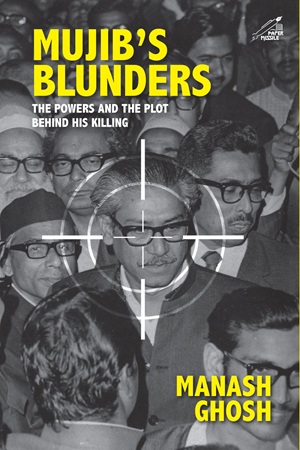Feb 07, 2026
Feb 07, 2026
by Ramesh Menon
Mujib’s Blunders
- The power and the plot behind his killing by Manash Ghosh
Niyogi Books 475 pages ₹795
Bangladesh recently made global headlines after mass protests led to the ouster of its Prime Minister, Sheikh Hasina. Despite impressive development gains and human indices that often outpaced India’s, the country’s politics remained deeply fractured. That fracture runs deep—right back to the country’s painful birth in 1971.
 Veteran journalist Manash Ghosh’s Mujib’s Blunders: The Power and the Plot Behind His Killing is a gripping, deeply researched narrative that explores how Sheikh Mujibur Rahman—revered as the Father of the Nation—was eventually brought down by the very forces he once united. Ghosh brings decades of on-the-ground reporting and first-hand insight, making this more than just history—it’s lived experience.
Veteran journalist Manash Ghosh’s Mujib’s Blunders: The Power and the Plot Behind His Killing is a gripping, deeply researched narrative that explores how Sheikh Mujibur Rahman—revered as the Father of the Nation—was eventually brought down by the very forces he once united. Ghosh brings decades of on-the-ground reporting and first-hand insight, making this more than just history—it’s lived experience.
A Front-Row Seat to History
As The Statesman’s bureau chief in Kolkata during the liberation war, Ghosh reported from ground zero. His earlier book chronicled the bloody birth of Bangladesh. This new volume picks up where that story left off—with the hope, disillusionment, conspiracies, and eventual betrayal that followed independence.
Ghosh traces how anti-India sentiment was deliberately whipped up in newly-liberated Bangladesh—fuelled by Pakistani agents, foreign intelligence operatives, and hostile propaganda. Even India’s sincere post-war support—from relief materials to currency printing—was spun into narratives of neocolonial ambition.
When India’s Security Printing Press in Nashik was tasked with printing one-taka notes, a rumour exploded: India was trying to hijack Bangladesh’s economy. The paranoia took root. Ghosh documents how suspicion grew, despite India bearing enormous costs to host millions of refugees and feed 93,000 Pakistani POWs.
Tajuddin: The Forgotten Architect
One of the most potent parts of the book deals with Tajuddin Ahmad, the interim Prime Minister during the war, while Mujib was imprisoned in Pakistan. Tajuddin, Ghosh argues, was instrumental in steering the country through crisis, showing political finesse and statecraft.
But once Mujib returned, Bhutto planted the seeds of suspicion—telling him that Tajuddin was plotting against him. Without any authentic inquiry, Mujib sidelined him.
Ghosh writes: “What hurt Tajuddin the most was that Bangabandhu (Mujib)… had him peremptorily relieved of his prime ministerial role and responsibility without any appreciation.”
Tajuddin was placed under surveillance. A war hero reduced to a threat.
Mujib’s Miscalculations
Bangladesh faced an uphill battle with the economy in shambles and industries looted or fled by West Pakistani owners. Yet Mujib made a string of errors: rehabilitating known collaborators, placing them in key positions, and ignoring warning signs of discontent within his own ranks.
Ghosh observes:
“The tragic part of Mujib’s character is that… he did nothing to forestall the execution of the worst ever political assassinations in the world’s history that befell him and 18 of his family members in 1975.”
He suggests Mujib's fatal flaw was his blind trust in people he believed he could win over, even when they had worked against the liberation effort.
Hasina’s Ouster: History Repeats
The book draws stunning parallels between Mujib’s assassination and his daughter Sheikh Hasina’s ouster nearly 50 years later. Ghosh alleges that in both cases, foreign hands—especially the United States and Pakistan—were involved.
He names diplomats and intelligence officers, including US Ambassador Peter Haas and Assistant Secretary of State Donald Lu, accusing them of orchestrating a “bloodless coup” in 2024. Their apparent grievance? Hasina’s refusal to hand over St. Martin’s Island in the Bay of Bengal for a US naval base.
Ghosh writes: “The very name Hasina was anathema to Dhaka-based American diplomats… The US administration strove hard to create chaos in its bid to control the country’s politics ever since Hasina came to power for the second time in 2009.”
Hasina, who survived 28 assassination attempts, including a grenade attack in 2004, is currently in exile in Delhi. Ghosh believes she may return—but only if she reforms the Awami League from within.
Mujib’s Blunders is a significant work not just for what it reveals about a pivotal moment in South Asian history, but for its urgent relevance today. The ghosts of 1975, Ghosh warns, still haunt Bangladesh—and the region.
It’s a sobering, detailed chronicle of idealism undone by mistrust, foreign interference, and political betrayal. This is essential reading for anyone interested in the subcontinent’s complex history.
26-Jul-2025
More by : Ramesh Menon